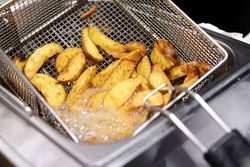
If you run a commercial kitchen, it’s extremely important to follow a routine grease trap cleaning schedule and ensure you have the correct-size unit. Doing so will ensure cleanliness and properly functioning plumbing and septic systems, as well as helping you keep your business up to code. New to the subject? People often ask similar questions about grease traps, so Cox’s Septic Service in Corbin, KY, has answered some of the most common ones below.
4 Common Questions About Grease Trap Cleaning
1. Why Does Grease Require Separate Disposal?
Grease takes on liquid form while hot, but as it cools down, it congeals into a solid, which is notorious for blocking up sewage systems, both private and municipal. At its worst, the substance can form massive “grease balls” over months of accumulation, requiring extensive repairs. It can lead to similar problems in a private septic system as well, causing your plumbing to clog or back up. Grease can also contaminate the water supply, and its proper disposal is often regulated by state and local laws.
2. Do I Need a Grease Trap?
 Most households don’t need a separate grease trap, as they may be fine simply disposing of oil and grease in the trash. This isn’t realistic, however, for larger food service establishments (FSEs), such as restaurants, which tend to run at a fast pace and need to take extra precautions against allowing grease into the septic system. If you operate an FSE and don’t have a grease trap, you may be breaking the law.
Most households don’t need a separate grease trap, as they may be fine simply disposing of oil and grease in the trash. This isn’t realistic, however, for larger food service establishments (FSEs), such as restaurants, which tend to run at a fast pace and need to take extra precautions against allowing grease into the septic system. If you operate an FSE and don’t have a grease trap, you may be breaking the law.
3. What Maintenance Do Grease Traps Require?
The right frequency for grease trap cleaning varies depending on the type. Under-the-counter (indoor) traps, for instance, generally require weekly cleaning, as they can be odorous. Outdoor and underground grease traps, which are usually larger, should be cleaned at least once every three months or more often for busy FSEs.
4. Is My Grease Trap Sufficient for My Needs?
Grease trap capacities are measured in gallons per minute (GPM), and the right capacity for your business depends on how much wastewater you produce. There are various formulas for calculating the ideal capacity for a business, and these depend on factors such as total sink volume and pipe flow rate. For guidance tailored to your specific needs, refer to a specialist.
If your Corbin, KY-based business requires grease trap cleaning, get in touch with Cox's Septic Service. They’ve served clients in a variety of industries, including restaurants, school cafeterias, and more, helping them adhere to all local, state, and federal regulations. Call (606) 528-4782 to request an estimate, or go online for more information about their services.
About the Business
Have a question? Ask the experts!
Send your question

